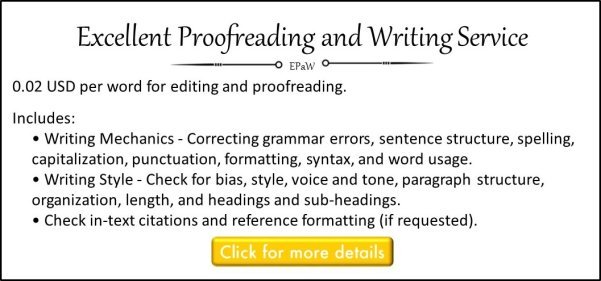Writing Help for Non-Fiction Writing
Everyone (or almost everyone) needs some writing help. This section offers help with English language usage when writing non-fiction text. The advice should be useful to native English speakers who just need to check they are doing it right and to ESL learners who need greater help.

Quoting, Paraphrasing and Summarizing

One of the biggest problems faced by academic writers is correctly incorporating someone else’s writing into their own. Many students get this wrong and end up being accused of plagiarism.
As well as citing the source in the text and including the reference in the reference section the material in the original source needs to be incorporated into your writing. There are three ways in which you can do this:
Quoting is the direct use of the works of the original author, paraphrasing is keeping most of the information from the original but rewriting it in your own words, while summarizing is restating only the main points in your own words. You must remember that all three of these methods need to be cited fully.

Word Choices in Non-fiction Writing
In non-fiction writing it's important to say what you mean and for what you say to mean what you intended it to mean.
Good fiction writing uses the choice of language to enhance the story telling. It should add to the feel and emotions of the writing.
Non-fiction writing is different. It should be clear and concise. More often than not innovative language choices are not appropriate for non-fiction writing. Word choice includes:
- Avoiding awkward, vague and unclear words
- Avoiding wordiness (using too many words)
- Avoiding clichés
- Correct use of key terms
Everything related to word choice is done to help the reader better understand what you're trying to tell them. The main reason for non-fiction writing is to convey information to the reader. For this to be effective it has to be done in the clearest way possible. That means using the correct words. This section on writing help will help you with this.
If you think you need to hire a good freelance copywriter I'd recommend Maria from Freelance-Writing-Sucess.com.

Scientific Style and Writing for an Academic Audience
Scientific style is the style of writing that's commonly found in scientific literature.
One of the most important parts of scientific style is using the passive voice. Many students and people new to scientific writing need writing help with the passive voice. This is where the result of an action is the subject rather than the doer of the action being the subject, of the sentence.
It is used in scientific writing as the methods and results being reported are more important for the reader than who created or produced them. For example:
- The students successfully completed their experiments. – Active sentence, the doer of the action (students) is the subject.
- The experiments were successfully completed, by the students. – Passive sentence, the receiver of the action (experiments) is the subject.
Scientific style also includes:
- Objectivity – including being fair, objective and keeping your personal feeling out of your writing. Objectivity can be achieved by using the passive voice.
- Clarity – the simplicity of your text and ease with which it can be read are important for scientific writing.
- Formality – includes avoiding the use of colloquial words and informal spoken English, contractions and the use of the first person pronoun “I”.
- Hedging – is not making absolute statements. You should leave room for your reader to disagree with you after they've read your whole argument.
When writing for an academic audience many writers feel that they've to show their intelligence by using big and complex words; words which they wouldn't normally use. This can lead to problems as they might use the words incorrectly, as they are unfamiliar. They often need writing help to write in a clear and concise style.
Academic writing is clear and convincing communication of your argument. It's much easier to explain your thoughts and argument if you use words you know and understand, and which are clear.
The language used does not show that you're clever. The advanced arguments, which you present using simple language, show you're clever.

If you're still experiencing problems and need writing help after you've read this section of the website I can help you. You can send your documents to me through The Excellent Proofreading and Writing Service for Your Documents page or contact me if you've any questions.
Alternatively if you need any help or would like to ask some questions you can visit the Excellent Proofreading and Writing Facebook page where I’d be happy to help you. You can also keep up to date with all new additions to this site at my Facebook page.

Return to Excellent Proofreading and Writing Homepage from Writing help for Non-Fiction Writing



By Jolyon Dodgson, copyright © 2011-2020.
Excellent-Proofreading-and-Writing.com - Proofreading and writing help for excellent first impressions.





New! Comments
Have your say about what you just read! Leave me a comment in the box below.